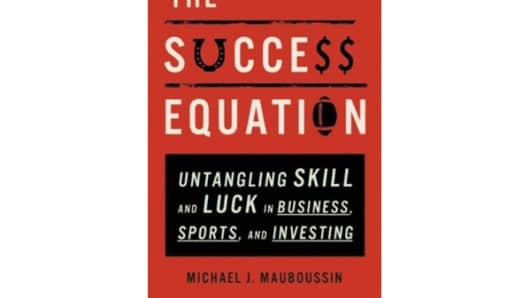GUEST AUTHOR BLOG by Michael J. Mauboussin author of "The Success Equation: Untangling Skill and Luck in Business, Sports, and Investing."
Say you're an investor looking to put some money to work in the market through a mutual fund. How do you pick which fund you'll invest in?
If you're like most people, you'll find a reputable investment company and scan for the funds that have done well recently. The chances are good that you'll buy one of these winners — and that you'll live to regret the decision. In fact, professors of finance calculate that buying high and selling low costs investors 1 percent of their returns every year, a sizeable sum.
It's useful to take a step back to consider why betting on continued success doesn't work in investing.
It certainly works in many other fields. For instance, you can count on the best chess players, sprinters or pianists to continue to perform at a high level for their next match, race or concert. In these activities, results correlate highly with skill, and luck plays little or no role.
But luck plays a huge role in determining results in investing, especially in the short term. Luck is also prominent in business strategy and card games —including blackjack and poker. One way to think about the difference between the results for pianists and poker players is to visualize a continuum with all luck at one end and all skill at the other. Then place activities along that continuum. Roulette wheels and lotteries are on the luck side, and swim and crew races are on the skill side. Most of the action in life sits between those extremes.
Here's the key: results are persistent from one period to the next only if performance relies mostly on skill. You can count on Yo-Yo Ma to play beautifully during his next cello concert because the outcome closely mirrors his skill every time he plays. But there's no way to know for sure how Phil Ivey will fare in the next World Series of Poker because even if he plays his cards just right, he may suffer from awful luck. On the skill side, short-term outcomes are indicative of skill. On the luck side, short-term results tell you little about skill.
The reason luck is so important in investing is not because investors are not skillful in the aggregate. It's actually the opposite. Investors are collectively pretty efficient at incorporating information into stock prices, which suggests that only new information moves stocks. I call this the "paradox of skill." As skill improves it tends to become more uniform, which means that luck becomes more decisive in determining results.
So how should you pick your next mutual fund? The answer is to focus on process. When luck is involved, a correct decision leads to a good outcome only with some probability. Play your hand perfectly at the blackjack table and you still may lose because of the bad turn of a card. It's also true that a poor process can yield a favorable outcome by dint of luck. But a good process provides the highest probability of success over time.
Judging process is not easy, but I recommend focusing on three areas:
- First try to get a sense of the investment manager's analytical process in order to determine whether it's economically sensible, disciplined, and sufficiently flexible.
- Next, ask whether the process recognizes and manages common behavioral biases, including overconfidence and anchoring.
- Finally, look at the organizational structure and ask whether it's conducive to focusing on returns for the investors or returns for the investment company. One statistic that may be useful is active share, a measure of how different a fund is from the benchmark to which it's compared. Funds with high active share, a sign of dedicated stock picking and moderate tracking error, — which suggests few big factor bets, have delivered excess returns, on average, over the past 20 years.
Sorting through the contributions of luck and skill is not always easy. But even a basic sense of where an activity lies on the luck-skill continuum can offer valuable input into the decisions that you make – in investing and beyond.
Michael J. Mauboussin is an investment strategist and adjunct professor at Columbia Business School. His most recent book is "The Success Equation: Untangling Skill and Luck in Business, Sports, and Investing" (Harvard Business Review Press, 2012).
Email me at bullishonbooks@cnbc.com — And follow me on Twitter @BullishonBooks


